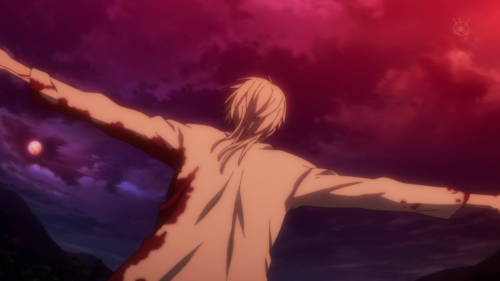One wouldn’t think it to look at them, but Shin Sekai Yori and Psycho-Pass were like two peas in a pod. Both deal in dystopian futures, social commentary and rebellion, both attempt to obfuscate their commentary by presenting it through morally-questionable speakers, and both refuse to end with everything neatly resolved. Suffice to say, I really enjoyed both series, but I’ve already had my say on Shin Sekai Yori. Now it’s time to write about Psycho-Pass, too.
One of the more controversial elements of the finale of Shin Sekai Yori is how it humanises the queerrat Squealer. After we’ve seen the world through his eyes, everything becomes a whole lot grayer, and in feeling that moral conflict, we’re able to understand just how broken that world truly was. Psycho-Pass’ antagonist, Makishima, is much more of a traditional villain, an arrogant serial killer without a shred of conscience. Even still, he has a point. The loss of freedom in Psycho-Pass is palpable, there’s no denying that, but the series’ perspective is intentionally conflicted. Our protagonists are the Enforcers of the State, criminal investigators under the control of an artificial intelligence called Sibyl. It has delivered a better way of life, but at some cost.
Apparently Psycho-Pass was inspired by Equilibrium, an action film with a similar story and a typically redemptive moral arc, but there’s no such thing in Psycho-Pass. The only guy attempting revolt is Makishima, the bloodthirsty psychopath. This is what I meant by conflicted, our Enforcers are protecting the broken government, while the serial killer is trying to defeat it. Who’s right? With the way Shin Sekai Yori delivers Squealer’s end, it’s intended to be devastating. When his arms are forced out in that Christ-like pose, it’s hard not to feel that something is terribly wrong, but when Makishima adopts a similar pose, it’s hard to feel anything at all. His cause is just, but he’s a despicable person. Like how Sibyl has developed a comfortable standard of living, but only through limiting an individual’s freedom of choice. There’s no easy answers here.

Kōgami is the one guy that we’re tempted to think is a hero. He abandons his life as an Enforcer and strikes out on his own, but when he’s finally holding a gun to Makishima’s head, he can’t help but pull the trigger. He escaped the system to kill someone. It’s like a slap in the face to anyone still clinging to the hope that Psycho-Pass could’ve had a hopeful ending. No-one is left uncompromised. Everyone is deeply wounded. Tsunemori is the closest it comes to having a moral compass, but even she’s forced to concede that, despite her loathing of it, Sibyl is a necessary evil needed to maintain order, at least for the time being. Is it right for a story to end like this? I doubt we’re truly supposed to like or empathise with any of these characters, but there’s more to fiction than just base empathy.
In terms of challenging the viewer and forcing us to question our own moral stance, it proves a fascinating experience, but for a series that seems to be about instigating change, the sad thing is that nothing has changed by its end. Weirdly, it isn’t a depressing watch. It doesn’t wallow in despair. This is the world, and it simply moves on with the status quo. Again, is that right? Or good? It’s realistic, I guess, and serves to warn us that our freedom is as precious as it is easily lost, and lost, at that, as a consequence of trying to do some good, like stamping out crime.
Recent months have been a treat, with weeks of rich, fascinating anime to consider and enjoy, but now Shin Sekai Yori and Psycho-Pass are over, I’m left wondering if these two were mere flukes, or perhaps mark the beginning of a new trend in anime of regularly producing mature, serious science fiction? I live in hope.

Leave a Reply